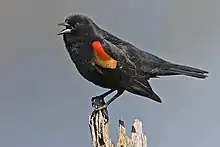chanate
English

A male great-tailed grackle in Arizona, United States.

A male red-winged blackbird in British Columbia, Canada.
Etymology 1
Borrowed from Spanish chanate, from a Nahuan language; cf. Classical Nahuatl tzanatl (“great-tailed grackle”).
Noun
chanate (plural chanates)
- a kind of bird
- 1989 [1974–1795], Ignaz Pfefferkorn, translated by Theodore E. Treutlein, Sonora: A Description of the Province, translation of original in German, page 122:
- The farmer will hardly have sowed his wheat and maize fields when whole flocks of hungry chanates descend upon the land, scratch out the seeds, and eat them.
- 2017, Tom Lea, The Wonderful Country:
- The black chanate birds were gathered, fluting their jangled morning songs under the pomegranates and figs as martin walked from the house.
- great-tailed grackle (Quiscalus mexicanus)
- red-winged blackbird (Agelaius phoeniceus)
- 2003, Rigoberto González, Crossing Vines: A Novel, page 67:
- “A chanate has come to pay us a visit,” doña Gertrudis said. [...] “It’s a black bird with red shoulders,”
- (Chicano, prison slang, derogatory) black person
- 2012, Santana Acuña, Saul Diskin, Santana and Saúl: A Dual Memoir, page 8:
- Pelaquillo's older brother was there. We called him Chanate, the name of a little black bird, because he was so dark.
- (Chicano, prison slang) coffee
Etymology 2
Borrowed from Portuguese chanate, from an indigenous language of Mozambique. This etymology is incomplete. You can help Wiktionary by elaborating on the origins of this term.
Noun
chanate (uncountable)
- a kind of tree (Colophospermum mopane)
- 2010, Jonathan Timberlake, Emmanuel Chidumayo, Louis Sawadogo, “Distribution and Characteristics of African Dry Forests and Woodlands”, in Emmanuel N. Chidumayo, Davison J Gumbo, editors, The Dry Forests and Woodlands of Africa: Managing for Products and Services, pages 20–21:
- The dominant tree, often to the exclusion of many others, is Colophospermum mopane, commonly known as mopane or chanate.
Synonyms
Noun
chanate (plural chanates)
- Obsolete spelling of khanate
- 1824 February, “An account of the Calmucs”, in The Asiatic Journal and Monthly Miscellany, volume 17, page 139:
- Gengis-Chan and Batuj spread terror over Europe. At a subsequent period this people separated into several Chanates.
- 1836, “Instructions of General Paskewitch Erivanski to Colonel Lazarew; February 26 1828”, in The Portfolio: A Collection of State Papers and Other Documents and Correspondance, Historical, Diplomatic and Commercial, volume 4, numbers 27-33:
- You are aware that almost all the Armenians residing in the different chanates of Azerbijan, and all the Greeks in the neighbourhood of the town of Ormi, a short time after our troops had occupied Tabreez, proclaimed their willingness to emigrate; that they terefore, during my stay at Deichagan, sent thither deputies, in order to receive permission to this effect.
- 1892, “Hunza, Nagyr, and the Pamir Regions”, in The Imperial and Asiatic Quarterly Review and Oriental and Colonial Record, page 66:
- Slavery on the Pamir is flourishing: moreover, the principal contingents of slaves are obtained from Chatrar, Jasen, and Kanshoot, chanates under the protectorate of England.
Anagrams
Portuguese
Etymology
From an indigenous language of Mozambique. This etymology is incomplete. You can help Wiktionary by elaborating on the origins of this term.
Spanish
Etymology
Borrowed from a Nahuan language; cf. Classical Nahuatl tzanatl. Doublet of zanate.
Noun
chanate m (plural chanates)
- (Mexico) great-tailed grackle (Quiscalus mexicanus)
- (Mexico, US) red-winged blackbird (Agelaius phoeniceus)
- (US, prison slang, derogatory) black person
- (US, prison slang) coffee
Derived terms
- ojo de chanate
References
- Cardozo-Freeman, Inez (1995) “The lingo of the pintos”, in Bilingual Review/La revista bilingüe, volume 20, number 1, pages 3–21
This article is issued from Wiktionary. The text is licensed under Creative Commons - Attribution - Sharealike. Additional terms may apply for the media files.